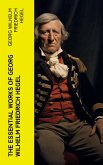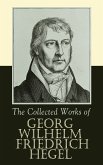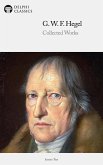In 'The Essential Works of Georg Wilhelm Friedrich Hegel,' the reader is introduced to a comprehensive selection of Hegel's philosophical writings, encapsulating his groundbreaking ideas on dialectics, the nature of reality, and the development of self-consciousness. This compilation manifests Hegel's distinctive literary style, characterized by intricate syntax and profound conceptual density, which invites rigorous engagement. Examining themes such as freedom, ethics, and history, the book situates Hegel within the intellectual currents of German Idealism, elucidating his influence on various fields, including philosophy, political theory, and theology. Georg Wilhelm Friedrich Hegel (1770-1831) was a pivotal figure in the evolution of modern philosophy. His formative years, marked by the Enlightenment and the tumult of the French Revolution, imbued him with a sense of history as a progressive force. This context, coupled with his academic pursuits in Tübingen and Jena, led Hegel to synthesize previous philosophical traditions into a dialectical framework that deeply critiques and reshapes them, making his ideas central to understanding philosophical discourse. This collection is essential for anyone seeking a deeper understanding of Hegel's philosophical framework and its enduring relevance. Engaging with these works not only enhances comprehension of Hegelian thought but also enriches one's perspective on contemporary philosophical debates, making it an indispensable read for scholars, students, and inquisitive minds alike.
Dieser Download kann aus rechtlichen Gründen nur mit Rechnungsadresse in A, B, BG, CY, CZ, D, DK, EW, FIN, F, GR, H, IRL, I, LT, L, LR, M, NL, PL, P, R, S, SLO, SK ausgeliefert werden.









